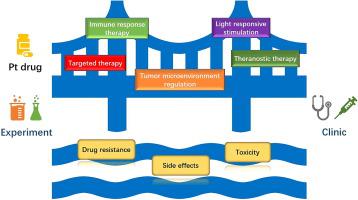Coordination Chemistry Reviews ( IF 20.3 ) Pub Date : 2021-09-14 , DOI: 10.1016/j.ccr.2021.214210 Kun Peng 1 , Bing-Bing Liang 1 , Wenting Liu 1 , Zong-Wan Mao 1

|
Encouraged by the worldwide success of cisplatin in the field of cancer chemotherapy, intensive works have been conducted to explore more platinum coordination complexes as antitumor drugs over half a century. Although a significant number of promising platinum complexes with multiple structural motifs have been emerging during this period, most of them failed to enter clinical applications. Abandoned reasons for platinum antitumor candidates from experiment to clinic are complicated, and corresponding strategies were proposed during the last decades to deal with those issues. In recent years, with the rapid development of targeted therapy, immunotherapy and so on, anticancer platinum drugs have gained new opportunities and challenges. In this review, we first overviewed the major problems associated with current platinum anticancer drugs including drug resistance, toxicity and side effects to “know our enemies”, and then described recent progresses in rational design of specific-targeted platinum complexes, immune response therapy, tumor microenvironment regulation, light-responsive stimulation, and theranostic therapy as promising strategies to cross these barriers. This review at the interface of chemistry, biology, and medicine points out main problems for current platinum drug development from their action mechanisms, and provides up-to-date potential strategies from drug design perspectives to circumvent those drawbacks, and it is supposed to enlighten researchers with more ideas for future development of highly efficient platinum antitumor complexes.
中文翻译:

是什么阻止了更多的抗癌铂配合物从实验到临床:药物设计角度的主要问题和潜在策略
受到顺铂在癌症化疗领域的全球成功的鼓舞,半个多世纪以来,已经开展了大量工作以探索更多铂配位配合物作为抗肿瘤药物。尽管在此期间出现了大量具有多种结构基序的有前景的铂配合物,但其中大多数未能进入临床应用。铂类抗肿瘤候选药物从实验到临床被放弃的原因很复杂,在过去的几十年中提出了相应的策略来解决这些问题。近年来,随着靶向治疗、免疫治疗等的快速发展,抗癌铂类药物获得了新的机遇和挑战。在这次审查中,我们首先概述了当前铂类抗癌药物存在的主要问题,包括耐药性、毒性和副作用,以“知己知彼”,然后描述了近年来在特异性靶向铂配合物的合理设计、免疫反应治疗、肿瘤微环境调节等方面的进展,光反应刺激和治疗诊断疗法是跨越这些障碍的有希望的策略。这篇化学、生物学和医学界面的综述从其作用机制指出了当前铂类药物开发的主要问题,并从药物设计的角度提供了最新的潜在策略来规避这些缺点,希望能启发我们研究人员对未来开发高效铂抗肿瘤复合物有更多想法。毒性和副作用以“了解我们的敌人”,然后描述了在特定靶向铂配合物的合理设计、免疫反应治疗、肿瘤微环境调节、光响应刺激和治疗诊断方面的最新进展,作为跨越这些障碍的有希望的策略。这篇化学、生物学和医学界面的综述从其作用机制指出了当前铂类药物开发的主要问题,并从药物设计的角度提供了最新的潜在策略来规避这些缺点,希望能启发我们研究人员对未来开发高效铂抗肿瘤复合物有更多想法。毒性和副作用以“了解我们的敌人”,然后描述了在特定靶向铂配合物的合理设计、免疫反应治疗、肿瘤微环境调节、光响应刺激和治疗诊断方面的最新进展,作为跨越这些障碍的有希望的策略。这篇化学、生物学和医学界面的综述从其作用机制指出了当前铂类药物开发的主要问题,并从药物设计的角度提供了最新的潜在策略来规避这些缺点,希望能启发我们研究人员对未来开发高效铂抗肿瘤复合物有更多想法。肿瘤微环境调节、光响应刺激和治疗诊断治疗是跨越这些障碍的有希望的策略。这篇化学、生物学和医学界面的综述从其作用机制指出了当前铂类药物开发的主要问题,并从药物设计的角度提供了最新的潜在策略来规避这些缺点,希望能启发我们研究人员对未来开发高效铂抗肿瘤复合物有更多想法。肿瘤微环境调节、光响应刺激和治疗诊断治疗是跨越这些障碍的有希望的策略。这篇化学、生物学和医学界面的综述从其作用机制指出了当前铂类药物开发的主要问题,并从药物设计的角度提供了最新的潜在策略来规避这些缺点,希望能启发我们研究人员对未来开发高效铂抗肿瘤复合物有更多想法。










































 京公网安备 11010802027423号
京公网安备 11010802027423号